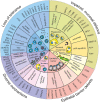Early-onset inflammatory bowel disease as a model disease to identify key regulators of immune homeostasis mechanisms
- PMID: 30565237
- PMCID: PMC7379380
- DOI: 10.1111/imr.12726
Early-onset inflammatory bowel disease as a model disease to identify key regulators of immune homeostasis mechanisms
Abstract
Rare, monogenetic diseases present unique models to dissect gene functions and biological pathways, concomitantly enhancing our understanding of the etiology of complex (and often more common) traits. Although inflammatory bowel disease (IBD) is a generally prototypic complex disease, it can also manifest in an early-onset, monogenic fashion, often following Mendelian modes of inheritance. Recent advances in genomic technologies have spurred the identification of genetic defects underlying rare, very early-onset IBD (VEO-IBD) as a disease subgroup driven by strong genetic influence, pinpointing key players in the delicate homeostasis of the immune system in the gut and illustrating the intimate relationships between bowel inflammation, systemic immune dysregulation, and primary immunodeficiency with increased susceptibility to infections. As for other human diseases, it is likely that adult-onset diseases may represent complex diseases integrating the effects of host genetic susceptibility and environmental triggers. Comparison of adult-onset IBD and VEO-IBD thus provides beautiful models to investigate the relationship between monogenic and multifactorial/polygenic diseases. This review discusses the present and novel findings regarding monogenic IBD as well as key questions and future directions of IBD research.
Keywords: genetics; inborn errors of immunity; inflammatory bowel disease; pathomechanisms.
© 2018 The Authors. Immunological Reviews Published by John Wiley & Sons Ltd.
Figures


Similar articles
-
Current concepts in pediatric inflammatory bowel disease; IL10/IL10R colitis as a model disease.Int J Pediatr Adolesc Med. 2019 Mar;6(1):1-5. doi: 10.1016/j.ijpam.2019.02.002. Epub 2019 Mar 12. Int J Pediatr Adolesc Med. 2019. PMID: 31304220 Free PMC article. Review.
-
The Growing Need to Understand Very Early Onset Inflammatory Bowel Disease.Front Immunol. 2021 May 26;12:675186. doi: 10.3389/fimmu.2021.675186. eCollection 2021. Front Immunol. 2021. PMID: 34122435 Free PMC article. Review.
-
Very Early Onset Inflammatory Bowel Disease: A Clinical Approach With a Focus on the Role of Genetics and Underlying Immune Deficiencies.Inflamm Bowel Dis. 2020 May 12;26(6):820-842. doi: 10.1093/ibd/izz259. Inflamm Bowel Dis. 2020. PMID: 31833544 Free PMC article. Review.
-
Clinical and laboratory predictors of monogenic very early onset inflammatory bowel disease.Clin Immunol. 2022 Jul;240:109047. doi: 10.1016/j.clim.2022.109047. Epub 2022 May 22. Clin Immunol. 2022. PMID: 35613698 Free PMC article.
-
The role of monogenic disease in children with very early onset inflammatory bowel disease.Curr Opin Pediatr. 2017 Oct;29(5):566-571. doi: 10.1097/MOP.0000000000000531. Curr Opin Pediatr. 2017. PMID: 28700415 Free PMC article. Review.
Cited by
-
Limosilactobacillus reuteri and Lacticaseibacillus rhamnosus GG differentially affect gut microbes and metabolites in mice with Treg deficiency.Am J Physiol Gastrointest Liver Physiol. 2021 Jun 1;320(6):G969-G981. doi: 10.1152/ajpgi.00072.2021. Epub 2021 Mar 31. Am J Physiol Gastrointest Liver Physiol. 2021. PMID: 33787352 Free PMC article.
-
Recent Insight into Herbal Bioactives-based Novel Approaches for Chronic Intestinal Inflammatory Disorders Therapy.Curr Pharm Biotechnol. 2024;25(14):1835-1857. doi: 10.2174/0113892010282432231222060355. Curr Pharm Biotechnol. 2024. PMID: 38310453 Review.
-
Inflammation in the peripheral blood system of Crohn's Disease.Clin Exp Med. 2023 Oct;23(6):2805-2812. doi: 10.1007/s10238-023-01030-3. Epub 2023 Feb 26. Clin Exp Med. 2023. PMID: 36842094
-
Natural History of Very Early Onset Inflammatory Bowel Disease in North America: A Retrospective Cohort Study.Inflamm Bowel Dis. 2021 Feb 16;27(3):295-302. doi: 10.1093/ibd/izaa080. Inflamm Bowel Dis. 2021. PMID: 32386060 Free PMC article.
-
[The gut: center of immunity : Rare inflammatory bowel diseases caused by immunodeficiencies].Pathologe. 2020 May;41(3):211-223. doi: 10.1007/s00292-020-00775-y. Pathologe. 2020. PMID: 32253499 Review. German.
References
-
- Bevins CL, Salzman NH. Paneth cells, antimicrobial peptides and maintenance of intestinal homeostasis. Nat Rev Microbiol. 2011;9:356‐368. - PubMed
-
- Peterson LW, Artis D. Intestinal epithelial cells: regulators of barrier function and immune homeostasis. Nat Publ Gr. 2014;14:141‐153. - PubMed
-
- Cho JH. The genetics and immunopathogenesis of inflammatory bowel disease. Nat Rev Immunol. 2008;8:458‐466. - PubMed
-
- Bouma G, Strober W. The immunological and genetic basis of inflammatory bowel disease. Nat Rev Immunol. 2003;3:521‐533. - PubMed
Publication types
MeSH terms
Grants and funding
LinkOut - more resources
Full Text Sources
Research Materials

